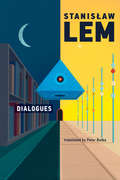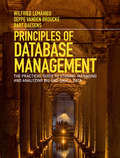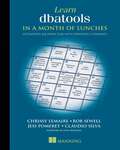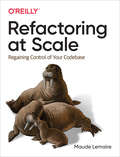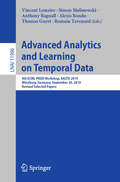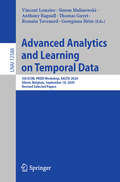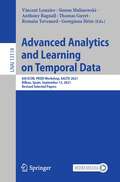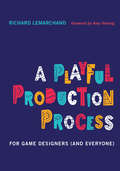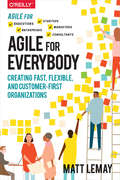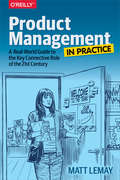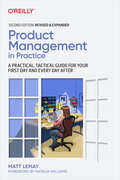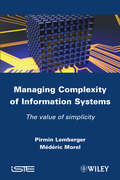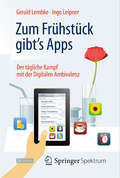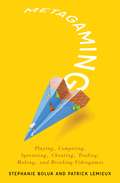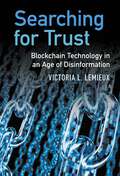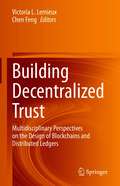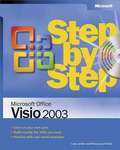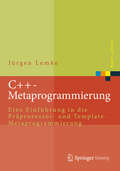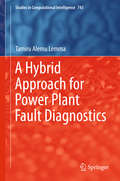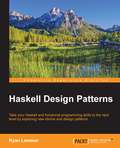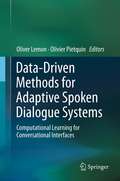- Table View
- List View
Dialogues
by Stanislaw LemThe first English translation of a nonfiction work by Stanisław Lem, which was "conceived under the spell of cybernetics" in 1957 and updated in 1971.In 1957, Stanisław Lem published Dialogues, a book "conceived under the spell of cybernetics," as he wrote in the preface to the second edition. Mimicking the form of Berkeley's Three Dialogues between Hylas and Philonous, Lem's original dialogue was an attempt to unravel the then-novel field of cybernetics. It was a testimony, Lem wrote later, to "the almost limitless cognitive optimism" he felt upon his discovery of cybernetics. This is the first English translation of Lem's Dialogues, including the text of the first edition and the later essays added to the second edition in 1971. For the second edition, Lem chose not to revise the original. Recognizing the naivete of his hopes for cybernetics, he constructed a supplement to the first dialogue, which consists of two critical essays, the first a summary of the evolution of cybernetics, the second a contribution to the cybernetic theory of the "sociopathology of governing," amending the first edition's discussion of the pathology of social regulation; and two previously published articles on related topics. From the vantage point of 1971, Lem observes that original book, begun as a search for methods "that would increase our understanding of both the human and nonhuman worlds," was in the end "an expression of the cognitive curiosity and anxiety of modern thought."
Principles of Database Management: The Practical Guide to Storing, Managing and Analyzing Big and Small Data
by Wilfried Lemahieu Seppe Vanden Broucke Bart BaesensThis comprehensive textbook teaches the fundamentals of database design, modeling, systems, data storage, and the evolving world of data warehousing, governance and more. Written by experienced educators and experts in big data, analytics, data quality, and data integration, it provides an up-to-date approach to database management. This full-color, illustrated text has a balanced theory-practice focus, covering essential topics, from established database technologies to recent trends, like Big Data, NoSQL, and more. Fundamental concepts are supported by real-world examples, query and code walkthroughs, and figures, making it perfect for introductory courses for advanced undergraduates and graduate students in information systems or computer science. These examples are further supported by an online playground with multiple learning environments, including MySQL; MongoDB; Neo4j Cypher; and tree structure visualization. This combined learning approach connects key concepts throughout the text to the important, practical tools to get started in database management.
Learn dbatools in a Month of Lunches: Automating SQL server tasks with PowerShell commands
by Chrissy LeMaire Rob Sewell Jess Pomfret Cláudio SilvaIf you work with SQL Server, dbatools is a lifesaver. This book will show you how to use this free and open source PowerShell module to automate just about every SQL server task you can imagine—all in just one month!In Learn dbatools in a Month of Lunches you will learn how to: Perform instance-to-instance and customized migrations Automate security audits, tempdb configuration, alerting, and reporting Schedule and monitor PowerShell tasks in SQL Server Agent Bulk-import any type of data into SQL Server Install dbatools in secure environments Written by a group of expert authors including dbatools creator Chrissy LeMaire, Learn dbatools in a Month of Lunches teaches you techniques that will make you more effective—and efficient—than you ever thought possible. In twenty-eight lunchbreak lessons, you&’ll learn the most important use cases of dbatools and the favorite functions of its core developers. Stabilize and standardize your SQL server environment, and simplify your tasks by building automation, alerting, and reporting with this powerful tool. About the technology For SQL Server DBAs, automation is the key to efficiency. Using the open-source dbatools PowerShell module, you can easily execute tasks on thousands of database servers at once—all from the command line. dbatools gives you over 500 pre-built commands, with countless new options for managing SQL Server at scale. There&’s nothing else like it. About the book Learn dbatools in a Month of Lunches teaches you how to automate SQL Server using the dbatools PowerShell module. Each 30-minute lesson introduces a new automation that will make your daily duties easier. Following the expert advice of dbatools creator Chrissy LeMaire and other top community contributors, you&’ll learn to script everything from backups to disaster recovery. What's inside Performing instance-to-instance and customized migrations Automating security audits, best practices, and standardized configurations Administering SQL Server Agent including running PowerShell scripts effectively Bulk-importing many types of data into SQL Server Executing advanced tasks and increasing efficiency for everyday administration About the reader For DBAs, accidental DBAs, and systems engineers who manage SQL Server. About the author Chrissy LeMaire is a GitHub Star and the creator of dbatools. Rob Sewell is a data engineer and a passionate automator. Jess Pomfret and Cláudio Silva are data platform architects. All are Microsoft MVPs. Table of Contents 1 Before you begin 2 Installing dbatools 3 The dbatools lab 4 A gentle introduction to dbatools commands 5 Writing to SQL Server 6 Finding SQL Server instances on your network 7 Inventorying your SQL estate 8 Registered Servers 9 Logins and users 10 Backups 11 Restore 12 Snapshots 13 Install and update SQL Server 14 Preparing for disaster 15 Performing your first advanced SQL Server instance migration, part 1 16 Performing your first advanced SQL Server instance migration, part 2 17 High availability and disaster recovery 18 PowerShell and SQL Server Agent 19 SQL Server Agent administration 20 Creating and working with SQL Server Agent objects 21 Data masking 22 DevOps automation 23 Tracing SQL Server activity 24 Security and encryption 25 Data compression 26 Validating your estate with dbachecks 27 Working in the cloud 28 dbatools configurations and logging 29 Never the end
Refactoring at Scale: Regaining Control Of Your Codebase
by Maude LemaireMaking significant changes to large, complex codebases is a daunting task--one that's nearly impossible to do successfully unless you have the right team, tools, and mindset. If your application is in need of a substantial overhaul and you're unsure how to go about implementing those changes in a sustainable way, then this book is for you.Software engineer Maude Lemaire walks you through the entire refactoring process from start to finish. You'll learn from her experience driving performance and refactoring efforts at Slack during a period of critical growth, including two case studies illustrating the impact these techniques can have in the real world. This book will help you achieve a newfound ability to productively introduce important changes in your codebase.Understand how code degrades and why some degradation is inevitableQuantify and qualify the state of your codebase before refactoringDraft a well-scoped execution plan with strategic milestonesWin support from engineering leadershipBuild and coordinate a team best suited for the projectCommunicate effectively inside and outside your teamAdopt best practices for successfully executing the refactor
Advanced Analytics and Learning on Temporal Data: 4th ECML PKDD Workshop, AALTD 2019, Würzburg, Germany, September 20, 2019, Revised Selected Papers (Lecture Notes in Computer Science #11986)
by Vincent Lemaire Simon Malinowski Anthony Bagnall Alexis Bondu Thomas Guyet Romain TavenardThis book constitutes the refereed proceedings of the 4th ECML PKDD Workshop on Advanced Analytics and Learning on Temporal Data, AALTD 2019, held in Würzburg, Germany, in September 2019. The 7 full papers presented together with 9 poster papers were carefully reviewed and selected from 31 submissions. The papers cover topics such as temporal data clustering; classification of univariate and multivariate time series; early classification of temporal data; deep learning and learning representations for temporal data; modeling temporal dependencies; advanced forecasting and prediction models; space-temporal statistical analysis; functional data analysis methods; temporal data streams; interpretable time-series analysis methods; dimensionality reduction, sparsity, algorithmic complexity and big data challenge; and bio-informatics, medical, energy consumption, on temporal data.
Advanced Analytics and Learning on Temporal Data: 5th ECML PKDD Workshop, AALTD 2020, Ghent, Belgium, September 18, 2020, Revised Selected Papers (Lecture Notes in Computer Science #12588)
by Vincent Lemaire Simon Malinowski Anthony Bagnall Thomas Guyet Romain Tavenard Georgiana IfrimThis book constitutes the refereed proceedings of the 4th ECML PKDD Workshop on Advanced Analytics and Learning on Temporal Data, AALTD 2019, held in Ghent, Belgium, in September 2020. The 15 full papers presented in this book were carefully reviewed and selected from 29 submissions. The selected papers are devoted to topics such as Temporal Data Clustering; Classification of Univariate and Multivariate Time Series; Early Classification of Temporal Data; Deep Learning and Learning Representations for Temporal Data; Modeling Temporal Dependencies; Advanced Forecasting and Prediction Models; Space-Temporal Statistical Analysis; Functional Data Analysis Methods; Temporal Data Streams; Interpretable Time-Series Analysis Methods; Dimensionality Reduction, Sparsity, Algorithmic Complexity and Big Data Challenge; and Bio-Informatics, Medical, Energy Consumption, Temporal Data.
Advanced Analytics and Learning on Temporal Data: 6th ECML PKDD Workshop, AALTD 2021, Bilbao, Spain, September 13, 2021, Revised Selected Papers (Lecture Notes in Computer Science #13114)
by Vincent Lemaire Simon Malinowski Anthony Bagnall Thomas Guyet Romain Tavenard Georgiana IfrimThis book constitutes the refereed proceedings of the 6th ECML PKDD Workshop on Advanced Analytics and Learning on Temporal Data, AALTD 2021, held during September 13-17, 2021. The workshop was planned to take place in Bilbao, Spain, but was held virtually due to the COVID-19 pandemic. The 12 full papers presented in this book were carefully reviewed and selected from 21 submissions. They focus on the following topics: Temporal Data Clustering; Classification of Univariate and Multivariate Time Series; Multivariate Time Series Co-clustering; Efficient Event Detection; Modeling Temporal Dependencies; Advanced Forecasting and Prediction Models; Cluster-based Forecasting; Explanation Methods for Time Series Classification; Multimodal Meta-Learning for Time Series Regression; and Multivariate Time Series Anomaly Detection.
A Playful Production Process: For Game Designers (and Everyone)
by Richard LemarchandHow to achieve a happier and healthier game design process by connecting the creative aspects of game design with techniques for effective project management. This book teaches game designers, aspiring game developers, and game design students how to take a digital game project from start to finish—from conceptualizing and designing to building, playtesting, and iterating—while avoiding the uncontrolled overwork known among developers as &“crunch.&” Written by a legendary game designer, A Playful Production Process outlines a process that connects the creative aspects of game design with proven techniques for effective project management. The book outlines four project phases—ideation, preproduction, full production, and post-production—that give designers and developers the milestones they need to advance from the first glimmerings of an idea to a finished game.
Superwrite: Alphabetic Writing System, Office Professional (Volume 1, 2nd Edition)
by A. James Lemaster John BaerVolume One introduces SuperWrite theory and beginning transcription principles. The step-by-step approach to writing principles guides students to alphabetic writing success. Eight lessons develop personal success factors such as goal-setting, problem-solving, time management, attendance, and promptness. Updated keyboarding style references reflect current business practices.
Agile for Everybody: Creating Fast, Flexible, and Customer-First Organizations
by Matt LeMayThe Agile movement provides real, actionable answers to the question that keeps many company leaders awake at night: How do we stay successful in a fast-changing and unpredictable world? Agile has already transformed how modern companies build and deliver software. This practical book demonstrates how entire organizations—from product managers and engineers to marketers and executives—can put Agile to work.Author Matt LeMay explains Agile in clear, jargon-free terms and provides concrete and actionable steps to help any team put its values and principles into practice. Examples from a wide variety of organizations, including small nonprofits and global financial enterprises, bring to life the on-the-ground realities of Agile across industries and functions.Understand exactly what Agile is and why it mattersUse Agile to address your organization’s specific needs and goalsTake customer centricity from theory into practiceStop wasting time in "report and critique" meetings and start making better decisionsCreate a harmonious cycle of learning, collaborating, and deliveringLearn from Agile experts at companies like IBM, Spotify, and Coca-Cola
Product Management in Practice: A Real-World Guide to the Key Connective Role of the 21st Century
by Matt LeMayProduct management has become a critical connective role for modern organizations, from small technology startups to global corporate enterprises. And yet the day-to-day work of product management remains largely misunderstood. In theory, product management is about building products that people love. The real-world practice of product management is often about difficult conversations, practical compromises, and hard-won incremental gains.In this book, author Matt LeMay focuses on the CORE connective skills—communication, organization, research, execution—that can build a successful product management practice across industries, organizations, teams, and toolsets.For current and would-be product managers, this book explores:Real-world tactics for facilitating collaboration and communicationHow to talk to users and work with executivesThe importance of setting clear and actionable goalsUsing roadmaps to connect and align your teamA values-first approach to implementing Agile practicesStories that convey realities of product management in the fieldCommon behavioral traps that turn good product managers bad
Product Management in Practice: A Practical, Tactical Guide For Your First Day And Every Day After
by Matt LeMayProduct management has become a critical function for modern organizations, from small startups to corporate enterprises. And yet, the day-to-day work of product management remains largely misunderstood. In theory, product managers are high-flying visionaries who build products that people love. In practice, they're hard-working facilitators who bring clarity and focus to their teams.In this thoroughly revised and expanded edition, Matt LeMay provides real-world guidance for current and aspiring product managers. Updated for the era of remote and hybrid work, this book provides actionable answers to product management's most persistent and confounding questions, starting with: What exactly am I supposed to do all day?With this book, you'll learn:What the day-to-day work of product management entails--and how to excel at itWhy no job title or description will resolve the ambiguity of your roleHow to bridge the false dichotomy between "strategy" and "execution"Why the temptation to focus on decks and documentation can be bad for your team (and for you)How to prioritize your time and pick your battles
Managing Complexity of Information Systems: The Value of Simplicity (Wiley-iste Ser. #607)
by Pirmin P. Lemberger Mederic MorelThis book is about complexity in Information Systems (IS). The subject is addressed from both conceptual and applied perspectives. Concepts are drawn from information theory, industrial design and software engineering. Its content capitalizes on experiences gathered by the authors during various contracting jobs involving software architecture, modeling and IS architecture that were conducted for large organizations in the banking and industry sectors, as well as in the public sector. The authors develop the point of view according to which mastering complexity involves two essential steps: first, one should develop a clear understanding of the real nature of complexity within the IS; second, one should identify the primary causes which contribute to its uncontrolled growth and organize these into a logical framework, in order to define efficient countermeasures. Both technical and psychological causes of complexity are to be considered. Two themes make up the main thread of the book: complexity and value. Both themes are quite common when considered separately, but their interplay remains a largely unexplored topic. The analysis of this interplay is one of the sources of originality of this book.
Zum Frühstück gibt's Apps: Mehr Durchblick in der digitalen Welt
by Gerald Lembke Ingo LeipnerWarum wir schon beim Frühstück Apps anstarren … Smartphone und Smart Home: Technik schaltet immer mehr unser Denken ab, weil wir ein bequemes Leben voller Spaß vorziehen. Dafür zahlen wir einen hohen Preis: Verlernen wir durch Lernprogramme das Lernen? Manipuliert uns Facebook, indem es unserer Eitelkeit schmeichelt? Gibt es Schutz vor Shitstorms und Cybermobbing? Wird Technik zum Heilsversprechen? Und das bereits beim Frühstück? Genau diese unbequemen Fragen stellt Zum Frühstück gibt´s Apps, um mehr Durchblick in der digitalen Welt zu schaffen. Das Buch liefert praktische Tipps, wie Sie digitale Medien bewusst einsetzen. Geschichten aus dem Alltag illustrieren, wo Fallen im Netz lauern und wie Sie ihnen ausweichen. So schaffen Sie Raum für echte Kommunikation zwischen Menschen – und landen nicht in jeder Marketingfalle der IT-Industrie. Handfeste Informationen in unterhaltsamer Form: Zum Frühstück gibt´s Apps schärft den Blick! Humorvoll, mit analytischer Tiefe!
Zum Frühstück gibt's Apps: Der tägliche Kampf mit der Digitalen Ambivalenz
by Gerald Lembke Ingo LeipnerWie wir in der neuen digitalen Welt die Orientierung verlieren – und wiedergewinnen Smartphone, Smart Home, Social Media: Das Internet ist allgegenwärtig und voller Verheißungen – intelligente Kommunikation, höchste Bequemlichkeit, unendlicher Spaß. Doch gleichzeitig wächst das Gefühl: Wir werden immer mehr zu Sklaven unserer Handys, Tablets und PCs, die gierig unsere Zeit verschlingen. Beginnen wir die reale Welt aus den Augen zu verlieren? Wir pendeln zwischen Oberflächlichkeit und Tiefe, zwischen Freiheit und Versklavung, zwischen Lust und Frust. Wohin der Blick am Bildschirm schweift – wir begegnen täglich der Digitalen Ambivalenz: Informationen überall und jederzeit, Freundschaften rund um den Globus, laufend spannende Ideen, die Wirtschaft und Gesellschaft auf den Kopf stellen – welch ein Segen!E-Mail-Terror, Smartphones im Dauereinsatz, Geheimdienste und Konzerne, die alle Daten absaugen – welch ein Fluch! Gewinnen Sie Ihre Orientierung im digitalen Dschungel zurück! Dieses Buch liefert praktische Tipps, wie Sie die neuen Medien bewusster einsetzen. So nutzen Sie die Digitalität, um Ziele und Ideen in der realen Welt zu verwirklichen. Geschichten aus dem Alltag illustrieren, wo Fallen im Netz lauern – und wie Sie ihnen ausweichen. So schaffen Sie sogar mehr Freiraum für „echte“ Kommunikation. Handfeste Informationen in unterhaltsamer Form: Zum Frühstück gibt´s Apps ist der Kompass für die neue digitale Welt. -----E-Mail-Fluten, Handy-Wahn, Shopping-Glück und Basisdemokratie im Netz – so vielfältig die digitale Welt ist, so facettenreich sind auch die Themen in Zum Frühstück gibt´s Apps. Die 18 Kapitel sind ein spannender Streifzug durch unseren Alltag, den Smartphone und Co. immer mehr beherrschen. Der rote Faden ist die Frage nach der Digitalen Ambivalenz. Was bringt die „schöne neue Welt“? Segen oder Fluch? Gewinn oder Verlust? Aufbruch oder Absturz? Mit diesen Fragen im Gepäck reisen die Autoren durch digitale Landschaften: Sie überlegen, wie viel Multitasking eine Hausarbeit an der Uni verträgt, ob die digitale Transformation in Unternehmen zu mehr Demokratie führt oder warum 3-Jährige auch gut ohne Tablets spielen können. Verlernen wir durch IT im Unterricht das Lernen? Schmeichelt Facebook nur der eigenen Eitelkeit? Wie schützen wir uns vor Shitstorms und Cybermobbing? Wer in der Digitalen Ambivalenz Orientierung finden will, dem bietet dieses Buch: Geschichten aus dem digitalen Alltag, die uns über die eigene Naivität schmunzeln lassen.Quergedachtes zu den Verführungen der IT-Industrie, die allzu oft das Blaue vom Himmel verspricht.Sofort umsetzbare Tipps, die für Beruf und Familie Wege im digitalen Dschungel aufzeigen. Zum Frühstück gibt´s Apps ist ein Appell zum bewussten Handeln in der digitalen Welt. Ein Buch, das die Widersprüche des Daten-Zeitalters aufzeigt! Humorvoll und mit analytischer Tiefe!
Metagaming: Playing, Competing, Spectating, Cheating, Trading, Making, and Breaking Videogames (Electronic Mediations #53)
by Patrick Lemieux Stephanie BolukThe greatest trick the videogame industry ever pulled was convincing the world that videogames were games rather than a medium for making metagames. Elegantly defined as “games about games,” metagames implicate a diverse range of practices that stray outside the boundaries and bend the rules: from technical glitches and forbidden strategies to Renaissance painting, algorithmic trading, professional sports, and the War on Terror. In Metagaming, Stephanie Boluk and Patrick LeMieux demonstrate how games always extend beyond the screen, and how modders, mappers, streamers, spectators, analysts, and artists are changing the way we play.Metagaming uncovers these alternative histories of play by exploring the strange experiences and unexpected effects that emerge in, on, around, and through videogames. Players puzzle through the problems of perspectival rendering in Portal, perform clandestine acts of electronic espionage in EVE Online, compete and commentate in Korean StarCraft, and speedrun The Legend of Zelda in record times (with or without the use of vision). Companies like Valve attempt to capture the metagame through international e-sports and online marketplaces while the corporate history of Super Mario Bros. is undermined by the endless levels of Infinite Mario, the frustrating pranks of Asshole Mario, and even Super Mario Clouds, a ROM hack exhibited at the Whitney Museum of American Art.One of the only books to include original software alongside each chapter, Metagaming transforms videogames from packaged products into instruments, equipment, tools, and toys for intervening in the sensory and political economies of everyday life. And although videogames conflate the creativity, criticality, and craft of play with the act of consumption, we don’t simply play videogames—we make metagames.
Financial Analysis and Risk Management: Data Governance, Analytics and Life Cycle Management
by Victoria LemieuxThe Global Financial Crisis and the Eurozone crisis that has followed have drawn attention to weaknesses in financial records, information and data. These weaknesses have led to operational risks in financial institutions, flawed bankruptcy and foreclosure proceedings following the Crisis, and inadequacies in financial supervisors' access to records and information for the purposes of a prudential response. Research is needed to identify the practices that will provide the records, information and data needed to support more effective financial analysis and risk management. The unique contribution of this volume is in bringing together researchers in distinct domains that seldom interact to identify theoretical, technological, policy and practical issues related to the management of financial records, information and data. The book will, therefore, appeal to researchers or advanced practitioners in the field of finance and those with an interest in risk management, computer science, cognitive science, sociology, management information systems, information science, and archival science as applied to the financial domain.
Searching for Trust: Blockchain Technology in an Age of Disinformation
by Victoria L. LemieuxSearching for Trust explores the intersection of trust, disinformation, and blockchain technology in an age of heightened institutional and epistemic mistrust. It adopts a unique archival theoretic lens to delve into how computational information processing has gradually supplanted traditional record keeping, putting at risk a centuries-old tradition of the 'moral defense of the record' and replacing it with a dominant ethos of information-processing efficiency. The author argues that focusing on information-processing efficiency over the defense of records against manipulation and corruption (the ancient task of the recordkeeper) has contributed to a diminution of the trustworthiness of information and a rise of disinformation, with attendant destabilization of the epistemic trust fabric of societies. Readers are asked to consider the potential and limitations of blockchains as the technological embodiment of the moral defense of the record and as means to restoring societal trust in an age of disinformation.
Building Decentralized Trust: Multidisciplinary Perspectives on the Design of Blockchains and Distributed Ledgers
by Victoria L. Lemieux Chen FengThis volume brings together a multidisciplinary group of scholars from diverse fields including computer science, engineering, archival science, law, business, psychology, economics, medicine and more to discuss the trade-offs between different “layers” in designing the use of blockchain/Distributed Ledger Technology (DLT) for social trust, trust in data and records, and trust in systems. Blockchain technology has emerged as a solution to the problem of trust in data and records, as well as trust in social, political and economic institutions, due to its profound potential as a digital trust infrastructure. Blockchain is a DLT in which confirmed and validated sets of transactions are stored in blocks that are chained together to make tampering more difficult and render records immutable. This book is dedicated to exploring and disseminating the latest findings on the relationships between socio-political and economic data, record-keeping, and technical aspects of blockchain.
Einführung in die Wirtschaftsinformatik
by Claudia Lemke Walter Brenner Kathrin KirchnerDieses Lehrbuch ist eine moderne und zukunftsweisende Einführung in die Wirtschaftsinformatik. Es kombiniert strategisches Wissen mit operativem Know-How. Als Leitfaden zur aktiven Gestaltung der komplexen Herausforderungen ist es die logische Fortsetzung des erfolgreichen ersten Bandes zum "Verstehen des digitalen Zeitalters".Die digitale Transformation ist die umfassendste Reformationsaufgabe von Wirtschaft und Gesellschaft und erfordert ein neues Set an Führungs- und Managementprinzipien. Daten und Algorithmen sind hierbei der universelle Rohstoff im digitalen Zeitalter. Das Buch liefert eine gut verständliche Einführung in die Programmierung und stellt ein Managementsystem zur Gestaltung der digitalen Transformation vor. Als Lehrbuch enthält es Lernziele und Kontrollfragen sowie Literaturempfehlungen zur weiterführenden Diskussionen. Dieser zweite Band eignet sich nicht nur für Studierende, sondern kann auch von Praktikern genutzt werden.
Microsoft® Office Visio® 2003 Step by Step
by Judy LemkeExperience learning made easy--and quickly teach yourself how to use Visio 2003, the Microsoft Office business and technical diagramming program. With STEP BY STEP, you can take just the lessons you need, or work from cover to cover. Either way, you drive the instruction--building and practicing the skills you need, just when you need them! Produce computer network diagrams, organization charts, floor plans, and more Use templates to create new diagrams and drawings quickly Add text, color, and 1-D and 2-D shapes Insert graphics and pictures, such as company logos Connect shapes to create a basic flowchart or timeline Link diagrams to files in other Microsoft Office programs to keep changes in synch Create your own shapes, stencils, and templates Your Microsoft Office System Reference Pack on CD includes: Microsoft Office System Quick Reference eBook Insider's Guide to Microsoft Office OneNote 2003 eBook Microsoft Computer Dictionary, Fifth Edition, eBook--10,000+ entries! Introducing the Tablet PC eBook Complete STEP BY STEP eBook Skill-building practice files A Note Regarding the CD or DVD The print version of this book ships with a CD or DVD. For those customers purchasing one of the digital formats in which this book is available, we are pleased to offer the CD/DVD content as a free download via O'Reilly Media's Digital Distribution services. To download this content, please visit O'Reilly's web site, search for the title of this book to find its catalog page, and click on the link below the cover image (Examples, Companion Content, or Practice Files). Note that while we provide as much of the media content as we are able via free download, we are sometimes limited by licensing restrictions. Please direct any questions or concerns to booktech@oreilly.com.
C++-Metaprogrammierung: Eine Einführung in die Präprozessor- und Template-Metaprogrammierung (Xpert.press)
by Jürgen LemkeDieses Buch ist das erste deutschsprachige Fachbuch zur C++-Metaprogrammierung. Es hilft dem C++ Programmierer, die Metaprogrammierung zu verstehen und die Vorteile f#65533;r den t#65533;glichen Gebrauch zu erkennen. Durch die umfangreiche Darstellung der Grundlagen der Pr#65533;prozessor- und Template-Metaprogrammierung bietet das Buch einen strukturierten Einstieg, f#65533;r den Grundkenntnisse in C++ ausreichend sind. Die Anwendung der Metaprogrammierung und ihr Zusammenspiel mit Softwaresystemen werden an vielen Beispielen ausf#65533;hrlich erl#65533;utert. Die Generierung der Modulschnittstellen wird hierbeierstmalig beschrieben. Es wird in den Beispielen der Metaprogrammierung sowohl auf den Standard C++11 als auch auf die . NET-Erweiterung C++/CLI eingegangen.
A Hybrid Approach for Power Plant Fault Diagnostics (Studies in Computational Intelligence #743)
by Tamiru Alemu LemmaThis book provides a hybrid approach to fault detection and diagnostics. It presents a detailed analysis related to practical applications of the fault detection and diagnostics framework, and highlights recent findings on power plant nonlinear model identification and fault diagnostics. The effectiveness of the methods presented is tested using data acquired from actual cogeneration and cooling plants (CCPs). The models presented were developed by applying Neuro-Fuzzy (NF) methods. The book offers a valuable resource for researchers and practicing engineers alike.
Haskell Design Patterns
by Ryan LemmerIf you're a Haskell programmer with a firm grasp of the basics and are ready to move more deeply into modern idiomatic Haskell programming, then this book is for you.
Data-Driven Methods for Adaptive Spoken Dialogue Systems: Computational Learning for Conversational Interfaces
by Oliver Lemon Olivier PietquinData driven methods have long been used in Automatic Speech Recognition (ASR) and Text-To-Speech (TTS) synthesis and have more recently been introduced for dialogue management, spoken language understanding, and Natural Language Generation. Machine learning is now present "end-to-end" in Spoken Dialogue Systems (SDS). However, these techniques require data collection and annotation campaigns, which can be time-consuming and expensive, as well as dataset expansion by simulation. In this book, we provide an overview of the current state of the field and of recent advances, with a specific focus on adaptivity.
